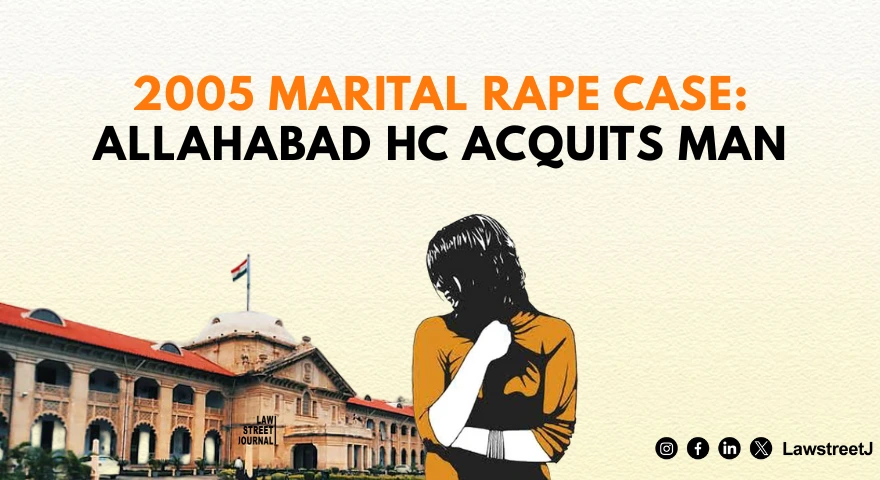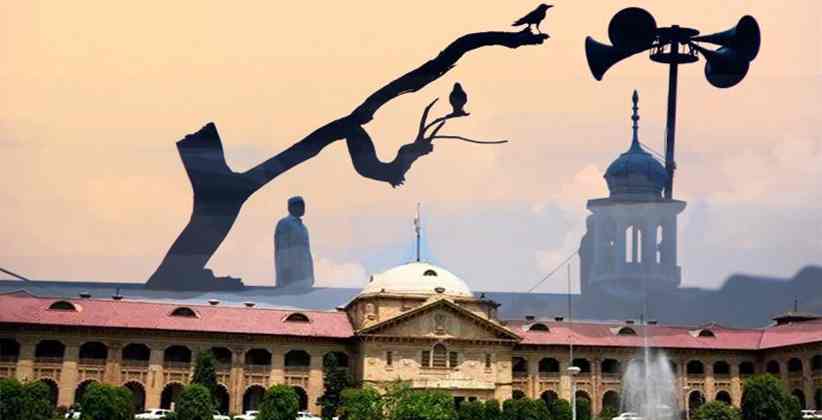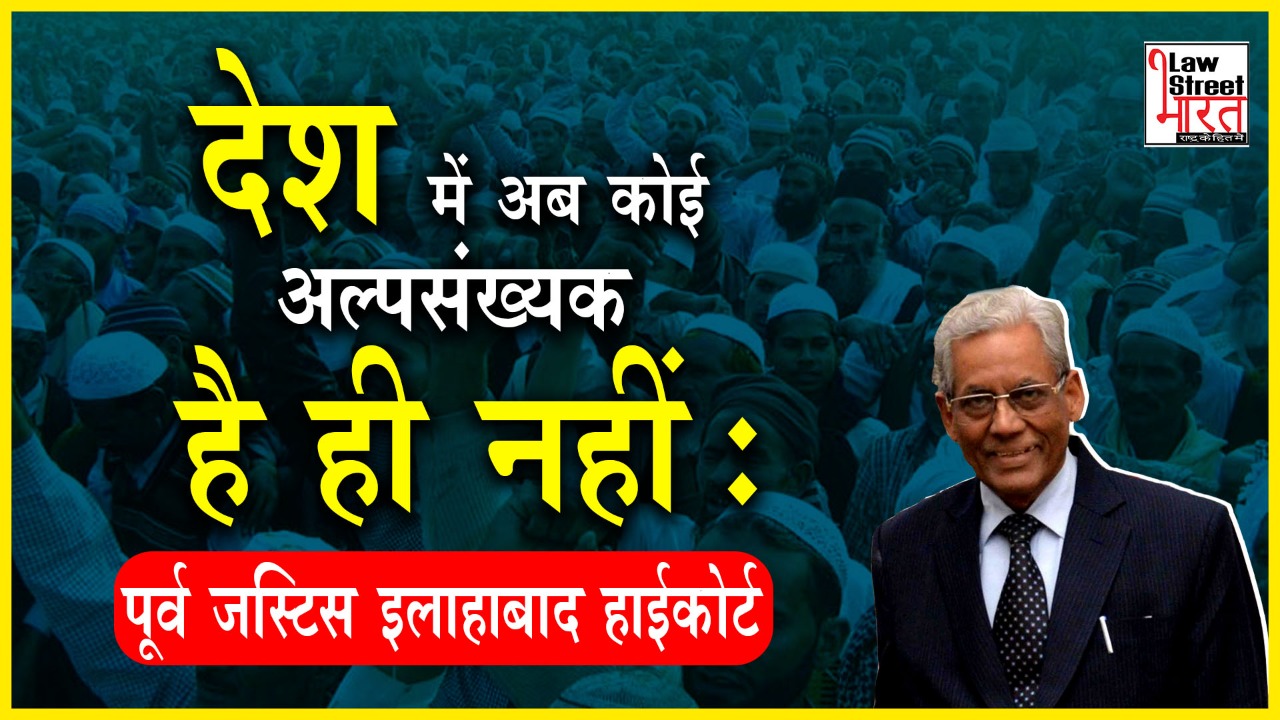Prayagraj: The Allahabad High Court has delivered a significant judgment acquitting a man convicted in 2007 for the marital rape of a minor girl, emphasizing that the Supreme Court’s landmark judgment in Independent Thought v. Union of India, which struck down Exception 2 to Section 375 IPC, has only prospective effect and cannot apply to incidents preceding it.
Justice Anil Kumar-X made crucial observations on the distinction between “taking” and “enticing” under kidnapping laws, the validity of marriage under Muslim Personal Law, and the temporal application of the Independent Thought judgment.
The court was hearing Criminal Appeal No. 6400 of 2007 filed by Islam @ Paltoo, challenging the judgment and order dated September 11, 2007, passed by the Additional Sessions Judge, Court No. 8, Kanpur Dehat. The court noted, “This criminal appeal has been preferred against the judgment whereby the appellant was found guilty under Section 363 IPC and was sentenced to five years and a fine of ₹1,000/-. Similarly, he was held guilty for offences under Sections 366 and 376 IPC.”
Addressing the background of the case, the court observed, “On September 25, 2005, a written complaint was submitted by informant Fazal Ahmad. It was alleged that his daughter, aged approximately 16 years, had gone outside to answer the call of nature when she was enticed away by the appellant and two other persons.”
The court highlighted the victim’s testimony, stating, “The victim testified that she had gone outside to answer the call of nature on August 25, 2005, and met the appellant there. The appellant asked her to accompany him on a trip. Together, they went to Kalpi, where she stayed with him for a day. Subsequently, the appellant took her to Bhopal, where he rented a room for her and she stayed there for a month.”
In a critical observation about the distinction between “taking” and “enticing”, the court stated, “The core difference is that ‘taking’ a minor is a physical act of causing the minor to go with the offender, regardless of their consent. ‘Enticing’, however, is a mental act where the offender uses manipulation or allure to influence the minor to go willingly, even if it’s something they would not have done otherwise.”
The court referenced the Supreme Court’s observations in Thakorlal D. Vadgdama v. State of Gujarat (AIR 1973 SC 2313), noting that “the word ‘takes’ does not necessarily connote taking by force and is not confined only to the use of force, actual or constructive. This word merely means ‘to cause to go,’ ‘to escort,’ or ‘to get into possession.’ The word ‘entice’ seems to involve the idea of inducement or allurement by giving rise to hope or desire in the other.”
Regarding the evidence required to prove kidnapping, the court observed, “In this case also, witnesses including parents and the victim have not divulged any fact from which any inference can be drawn that the victim was either enticed or taken by the appellant, except making bald allegations of ‘enticing’ and ‘taking.’ The circumstances disclosed by the victim also manifest that their elopement was premeditated.”
The court emphasized the distinction drawn in S. Varadarajan v. State of Madras (AIR 1965 SC 942), stating, “There is a distinction between ‘taking’ and allowing a minor to accompany a person. Something more has to be shown in a case of this kind, and that is some kind of inducement held out by the accused person or active participation by him in the formation of the intention of the minor to leave the house of the guardian.”
Regarding the validity of marriage under Muslim Law, the court observed, “Both parties are Muslim and have performed marriage as per Muslim rites and customs. The victim has admitted that her Nikah was performed at Kalpi, and the appellant has produced the Nikahnama. Article 195 from the book Principles of Mohammedan Law by Sir Dinshah Fardunji Mulla lays down that every Mahomedan of sound mind who has attained puberty may enter into a contract of marriage. Puberty is presumed, in the absence of evidence, on completion of the age of fifteen years.”
In addressing the Prohibition of Child Marriage Act, 2006, the court stated, “Section 3 of the Act holds that child marriages are voidable at the option of the contracting party being a child. Therefore, it is apparent from the Act that the marriage in this case would, at most, be held to be voidable.”
The court extensively discussed the Supreme Court’s judgment in Independent Thought v. Union of India (AIR 2017 SC 4904), noting that “the issue was limited but one of considerable public importance — whether sexual intercourse between a man and his wife, being a girl between 15 and 18 years of age, is rape. Exception 2 to Section 375 of the Indian Penal Code answered this in the negative, but the Supreme Court held that sexual intercourse with a girl below 18 years of age is rape regardless of whether she is married or not.”
In a critical observation about the temporal application of the judgment, the court stated, “From the foregoing observations as held by the Hon’ble Supreme Court in Independent Thought (supra), it is apparent that Exception 2 to Section 375 IPC has been struck down on the ground that the said provision is inconsistent with the provisions of the POCSO Act and is also violative of Articles 14, 15, and 21. But it has also been held that the said judgment of the Supreme Court will have prospective effect.”
The court emphasized the crucial timeline, observing, “In this particular case, it is apparent that the alleged occurrence took place way back in the year 2005. Therefore, the appellant cannot be held guilty for the commission of rape because the victim, at the time of occurrence, was above 16 years of age, and physical relations between the two had taken place after the solemnisation of their marriage.”
In its final directive, the court stated, “In view of the above, the present appeal is allowed and the appellant is acquitted of the charges. Accordingly, the judgment of conviction and order of sentence are set aside.”
The court further emphasized that the prosecution failed to lead any evidence to suggest that the victim was either “enticed” or “taken” by the appellant and that evidence pertaining to kidnapping and abducting the minor in order to compel her to marry was missing.
Case Title: Islam @ Paltoo v. State of U.P.




!["No Loudspeakers For Azan, No Fundamental Right To Create Noise," Says Allahabad HC To Two Mosques [Read Judgment]](/secure/uploads/2020/01/lj_4995_Allahabad_HC_AZAN.jpg)






